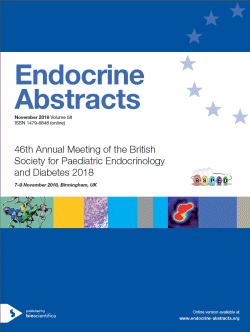Searchable abstracts of presentations at key conferences in endocrinology

46th Meeting of the British Society for Paediatric Endocrinology and Diabetes
Birmingham,
UK
07 Nov 2018 - 09 Nov 2018

Birmingham, UK - 7-9 November 2018
46th Annual Meeting of the British Society for Paediatric Endocrinology and Diabetes 2018
CME Training Day Abstracts
ea0058cme1.1 | CME Training Day Abstracts
Abstract unavailable
ea0058cme1.2 | CME Training Day Abstracts
Abstract unavailable
ea0058cme2.1 | CME Training Day Abstracts
Abstract unavailable
ea0058cme3.2 | CME Training Day Abstracts
Abstract unavailable
ea0058cme4.2 | CME Training Day Abstracts



